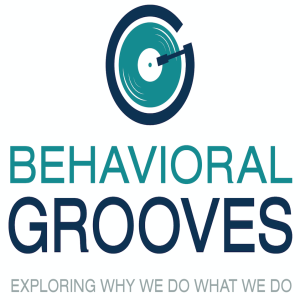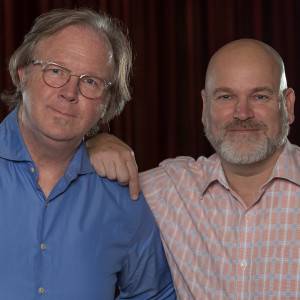
Stories, science and secrets from the world’s brightest thought-leaders. Behavioral Grooves is the podcast that satisfies your curiosity of why we do what we do. Explanations of human behavior that will improve your relationships, your wellbeing, and your organization by helping you find your groove.
Episodes

Sunday Mar 08, 2020
John Fuisz: Tracking Emotional Vectors
Sunday Mar 08, 2020
Sunday Mar 08, 2020
John Fuisz is co-founder of Veriphix and a marketer who believes in building great brands. He does so with a sophisticated system that, on the surface, appears simple and direct; however, it’s built on his astute observations of consumer behavior, the clever use of data, and most importantly, it’s related to Annie Duke’s use of bets to measure future behaviors.
We wanted to talk to John because his work tracks the seemingly subtle, yet extremely powerful, ways our buying and voting behaviors can be influenced.
Veriphix connects brands with users with three primary tools: First, by tracking emotional vectors, to understand how we feel about things on a weekly basis by asking them to make bets about what they expect to feel. Second by monitoring the emotional triggers that get us to do the things we do. Lastly, he watches for the implicit delta, the measure of the emotional impact of an issue. And he does so with very strict ethical standards.
John believes that marketers should elevate their messaging to build great brands, not just influence our subconscious decision making. He wants to dilute the impact that nefarious actors have on consumers (and voters) by challenging us to a meaningful first step. He notes, “We want to believe we’re rational humans, but to have an effective defense [against bad actors], we have to admit we’re irrational.”
Please take a moment to rate Behavioral Grooves or leave us a review. Our podcast doesn’t have advertisers; rather, we rely on listeners like to you help us get the word out. Your help is greatly appreciated.
We hope you enjoy our conversation with John Fuisz.
Kurt Nelson, PhD: @WhatMotivates
Tim Houlihan: @THoulihan
© 2020 Behavioral Grooves
Links
John Fuisz: https://www.linkedin.com/in/john-fuisz/
Veriphix: https://veriphix.com/
Annie Duke: https://www.annieduke.com/
“Thinking In Bets”: https://www.amazon.com/Annie-Duke/e/B001K88E4U/
Claire McCaskill “Korea”: https://www.vox.com/2018/8/20/17759574/midterm-russia-china-north-korea-iran-hack-cyber
DARPA: https://www.darpa.mil/
Christopher Wylie: https://en.wikipedia.org/wiki/Christopher_Wylie
“Mind Fuck”: https://www.amazon.com/Mindf-Cambridge-Analytica-Break-America/dp/1984854631
Ozan Varol “Think Like a Rocket Scientist”: https://www.amazon.com/Think-Like-Rocket-Scientist-Strategies/dp/1541762592
Common Biases and Heuristics: https://docs.google.com/document/d/1XHpBr0VFcaT8wIUpr-9zMIb79dFMgOVFRxIZRybiftI/edit#
Charlotte Blank: https://www.linkedin.com/in/charlotte-blank-52554a2/
Jeff Kreisler: http://jeffkreisler.com/
Neuromarketing World Forum: https://www.neuromarketingworldforum.com/
Darren Brown video: https://www.youtube.com/watch?v=YQXe1CokWqQ
John Bargh and Replication: https://replicationindex.com/2019/03/17/raudit-bargh/
Moral Foundations: https://moralfoundations.org/
Kids Priming video: https://www.youtube.com/watch?feature=youtu.be&v=TLf2gOrL1iM&app=desktop
Musical Links
Depeche Mode: http://www.depechemode.com/
Sharon Van Etten: https://www.youtube.com/watch?v=j7sTHoeH0eA
Gary Clark, Jr.: https://www.youtube.com/watch?v=gYXMDCNjl8M
Guy Clark: https://en.wikipedia.org/wiki/Guy_Clark
Ziggy Marley: https://en.wikipedia.org/wiki/Ziggy_Marley
New Order: https://en.wikipedia.org/wiki/New_Order_(band)
The National: https://en.wikipedia.org/wiki/The_National_(band)
Sha-Na-Na: https://en.wikipedia.org/wiki/Sha_Na_Na
Sinead O’Connor: https://en.wikipedia.org/wiki/Sin%C3%A9ad_O%27Connor
Wolfman Jack: https://en.wikipedia.org/wiki/Wolfman_Jack
Iron & Wine: https://en.wikipedia.org/wiki/Iron_%26_Wine
Calexico: https://en.wikipedia.org/wiki/Calexico_(band)
Madison Cunningham: https://www.youtube.com/watch?v=7-VSDUqVmnI

Sunday Mar 01, 2020
Andrew Wagner: The Economics Inside Online Games
Sunday Mar 01, 2020
Sunday Mar 01, 2020
Author and economist Andrew Wagner’s new book, The Economics of Online Gaming, shares how economic decisions get made by players of online games. We discuss how reputations and player behaviors impact success in the game.
For instance, a very positive reputation could lead other players to work with you, but it also could lead them to take advantage of you. Andrew discovered, in this game, that while a bad reputation sets people against you, it also provided unforeseen benefits in the game, economically speaking, of course.
We agree with Andrew that economics can be intimidating because it is a math-heavy field. To some, economics is simply inaccessible. However, we all love the drama found in video games, so Andrew combined drama with economics in his book.
Also, if you’ve not checked out our new podcast channel, Weekly Grooves, please do so. Each weekly episode is short-commute ready (no more than 15 minutes long) and brings behavioral insights to the week’s headlines.
© 2020 Behavioral Grooves
Kurt Nelson, PhD: @WhatMotivates
Tim Houlihan: @THoulihan
Links
Andrew Wagner: https://www.linkedin.com/in/atwagner/
The Economics of Online Gaming: https://www.businessexpertpress.com/books/the-economics-of-online-gaming-a-players-introduction-to-economic-thinking/
Eternal Lands: https://en.wikipedia.org/wiki/Eternal_Lands
PacMan: https://en.wikipedia.org/wiki/Pac-Man
Guide to Common Biases and Heuristics: https://docs.google.com/document/d/1XHpBr0VFcaT8wIUpr-9zMIb79dFMgOVFRxIZRybiftI/edit#
Ponzi Scheme: https://en.wikipedia.org/wiki/Ponzi_scheme
Tom Petters: https://en.wikipedia.org/wiki/Tom_Petters
Bernie Madoff: https://en.wikipedia.org/wiki/Bernie_Madoff
Multilevel Marketing: https://en.wikipedia.org/wiki/Multi-level_marketing
Economies of Scale: https://en.wikipedia.org/wiki/Economies_of_scale
Reputation Capital: https://en.wikipedia.org/wiki/Reputation_capital
Comcast: https://en.wikipedia.org/wiki/Comcast
Risk Tolerance: https://en.wikipedia.org/wiki/Risk_aversion
Ethics: https://en.wikipedia.org/wiki/Ethics
Jeff Kreisler: https://www.harpercollinsspeakersbureau.com/speaker/jeff-kreisler/
Alex Azar: https://en.wikipedia.org/wiki/Alex_Azar
Boeing 737Max: https://en.wikipedia.org/wiki/Boeing_737_MAX
FAA: https://en.wikipedia.org/wiki/Federal_Aviation_Administration
Dan Ariely: https://en.wikipedia.org/wiki/Dan_Ariely
Napster: https://en.wikipedia.org/wiki/Napster
Welcome Back Kotter: https://en.wikipedia.org/wiki/Welcome_Back,_Kotter
Weekly Grooves: https://weeklygrooves.podbean.com/
Musical Links
Staind: https://en.wikipedia.org/wiki/Staind
The Fray: https://en.wikipedia.org/wiki/The_Fray
Cold Play: https://en.wikipedia.org/wiki/Coldplay
Fuel: https://en.wikipedia.org/wiki/Fuel_(band)
Green Day: https://en.wikipedia.org/wiki/Green_Day
The Rembrandts: https://en.wikipedia.org/wiki/The_Rembrandts
“I’ll Be There For You” Theme Song: https://en.wikipedia.org/wiki/I%27ll_Be_There_for_You_(The_Rembrandts_song)
John Sebastian: https://en.wikipedia.org/wiki/John_Sebastian
“Welcome Back” Theme Song: https://en.wikipedia.org/wiki/Welcome_Back_(John_Sebastian_song)
The Lovin’ Spoonful: https://en.wikipedia.org/wiki/The_Lovin%27_Spoonful

Sunday Feb 23, 2020
Ethical Application of Behavioral Science in the Workplace
Sunday Feb 23, 2020
Sunday Feb 23, 2020
In this special edition, bestselling author and Forbes contributor, Rodd Wagner, organized a question-and-answer session with Kurt and Tim in front of a live audience to discuss whether behavioral sciences could be applied to corporate environments in ways that allow leaders to manipulate their employees. And, if so, where does that land on the ethical spectrum?
Rodd has grown increasingly intrigued and sometimes concerned that behavioral science has reached a point of refinement and adoption that it could create an unprecedented and unfair imbalance in the social contract between companies and the people who work at them.
For example, IBM claims it can predict with 95 percent accuracy whether someone is about to resign and some companies are experimenting with selection systems in which candidates interact first with robots.
Rodd, Kurt, and Tim are joined by John Harris, currently the Lead UX Design Researcher in the Healthcare Business Group at 3M and was recently a Projects Director at ideas42, a premiere pro-social non-profit organization. John started his career at the United Nations Economic Commission for Africa and continues to maintain a very pro-social mindset.
Some of the issues covered in our conversation included: What if corporate leaders can keep their employee satisfaction scores the same by giving employees water bottles rather than raises? What if the “client” was the rank and file of the firm, rather than the leaders? If nudges are aggregated, do they necessarily become manipulative? Is there a single ethical code that should be applied to every situation?
We hope you join us for this non-traditional approach to our podcast.
Kurt Nelson, PhD: @WhatMotivates
Tim Houlihan: @THoulihan
Sponsored by:
Lantern Group: http://lanterngroup.com/
BehaviorAlchemy: https://www.behavioralchemy.com/
© 2020 Behavioral Grooves
Links
Rodd Wagner: https://www.linkedin.com/in/roddwagner/
John Harris: https://www.linkedin.com/in/johnharrisiv/
Kurt Nelson, PhD: https://www.linkedin.com/in/kurtwnelson/
Tim Houlihan: https://www.linkedin.com/in/tim-houlihan-b-e/
Azul Seven: https://azulseven.com/
Rodd Wagner Episode: https://behavioralgrooves.com/episode/rodd-wagner-this-episode-could-save-your-life/
Steve Sisler Episode: https://behavioralgrooves.com/episode/steven-sisler-seeing-people-as-we-are/
Katie Milkman, PhD Episode: https://behavioralgrooves.com/episode/katy-milkman-behavior-change-for-good/
Cristina Bicchieri, PhD Episode: https://behavioralgrooves.com/episode/cristina-bicchieri-social-norms-are-bundles-of-expectations/
Victoria Shaffer, PhD Episode: https://behavioralgrooves.com/episode/victoria-schaffer-end-of-life-decision-tools/
Patricia Norberg, PhD: https://directory.qu.edu/Profile/27981
Magical Thinking, Eric Oliver, PhD: https://voices.uchicago.edu/religionsinamerica/2018/01/26/21-workshop-measuring-an-intuitionist-worldview-by-professor-eric-oliver/
Behavioural Insights Team: https://www.bi.team/
Doug Burgum: https://en.wikipedia.org/wiki/Doug_Burgum
Great Plains Software (now Microsoft Dynamics): https://en.wikipedia.org/wiki/Microsoft_Dynamics_GP
Casuistry: https://en.wikipedia.org/wiki/Casuistry

Sunday Feb 16, 2020
Adam Hansen: Beyond Innovation
Sunday Feb 16, 2020
Sunday Feb 16, 2020
As a new product and innovation professional, Adam Hansen has always believed in the power of possibility – accepting new approaches, questioning conventional wisdom, and being open to anything. This impulse led him to a career in developing new products for innovative companies such as Mars, Melaleuca and American Harvest, before joining the innovation firm, Ideas To Go, in 2001.
Now as a facilitator, Adam is passionate about helping clients understand their own possibilities—even beyond the scope of their projects—so they take the innovative energy and momentum they gained at ITG back to their own organizations.
Adam is the co-author of Outsmart Your Instincts – How The Behavioral Innovation™ Approach Drives Your Company Forward, which explores the intersection of behavioral science and innovation, revealing simple ways to get past the nonconscious cognitive biases that make innovation unnecessarily difficult.
Adam’s path to innovation process started with an MBA in product management from Indiana University. He also cultivated his passion for New Product Development on the board of the Product Development & Management Association and serving as a volunteer innovation advisor for the National HIV Clinicians’ Network at UCSF.
Links
Adam Hansen: https://www.linkedin.com/in/adhansen/
“Outsmart Your Instincts”: https://www.amazon.com/Outsmart-Your-Instincts-Behavioral-Innovation/dp/0997384506
M&M Mars: https://marschocolate.com/
Ideas to Go: https://www.ideastogo.com/
Metacognition: https://en.wikipedia.org/wiki/Metacognition
Biases & Heuristics: https://docs.google.com/document/d/1XHpBr0VFcaT8wIUpr-9zMIb79dFMgOVFRxIZRybiftI/edit?usp=sharing
Teresa Amabile, PhD “Brilliant but Cruel”: https://www.hbs.edu/faculty/Pages/profile.aspx?facId=6409
“Yes, and…”: https://bigthink.com/experts-corner/why-yes-and-might-be-the-most-valuable-phrase-in-business
Viktor Frankl: https://en.wikipedia.org/wiki/Viktor_Frankl
Kurt Lewin: https://en.wikipedia.org/wiki/Kurt_Lewin
Johan Huizinga: https://en.wikipedia.org/wiki/Johan_Huizinga
Homo Ludens/The Playful Ape: https://en.wikipedia.org/wiki/Homo_Ludens
System 1 / System 2 Thinking: https://en.wikipedia.org/wiki/Thinking,_Fast_and_Slow
Assumption Busting: https://www.ideastogo.com/articles-on-innovation/assumption-busting-with-ikea
Functional Fixedness: https://en.wikipedia.org/wiki/Functional_fixedness
Conformity: https://en.wikipedia.org/wiki/Conformity
Progress Principle: https://www.hbs.edu/faculty/Pages/item.aspx?num=40692
Blood Harmony: https://www.deseret.com/1999/6/10/19449890/sibling-harmony-br-family-members-often-have-tight-vocal-harmony
Hammond Organ: https://en.wikipedia.org/wiki/Hammond_organ
Leslie Speaker: https://en.wikipedia.org/wiki/Leslie_speaker
Rap: https://en.wikipedia.org/wiki/Rapping
Rock n Roll: https://en.wikipedia.org/wiki/Rock_and_roll
Major Third Chord: https://en.wikipedia.org/wiki/Third_(chord)
Major Ninth: https://en.wikipedia.org/wiki/Ninth
Two-Seventh Resolving to Five: https://www.hearandplay.com/main/resolve-dominant-seventh-chords
Linnea Gandhi episode: https://behavioralgrooves.com/episode/linnea-gandhi-crushing-on-statistics/
John Sweeney episode: https://behavioralgrooves.com/episode/john-sweeney-everything-is-a-story/
NY Times – Overcoming Your Negativity Bias: https://dealbook.nytimes.com/2013/06/14/overcoming-your-negativity-bias/
John Cacioppo: https://www.psychologytoday.com/us/articles/200306/our-brains-negative-bias
Homo Ludens, by Johan Huizinga: https://en.wikipedia.org/wiki/Homo_Ludens
Musical Links
Iron Butterfly “In A Gadda Da Vida”: https://www.youtube.com/watch?v=UIVe-rZBcm4
Deep Purple “Smoke on the Water”: https://www.youtube.com/watch?v=zUwEIt9ez7M
Doobie Brothers “China Grove”: https://www.youtube.com/watch?v=udSHItTjWyQ
Steely Dan “Don’t Take Me Alive”: https://www.youtube.com/watch?v=3gV1sxB8TxI
Monkees “Pleasant Valley Sunday”: https://www.youtube.com/watch?v=sUzs5dlLrm0
The Thorns “Among the Living”: https://www.youtube.com/watch?v=uh-aL6FCvMY
Crosby, Stills & Nash: https://www.youtube.com/watch?v=cMJug2iz3NA
The Beatles “Rubber Soul”: https://en.wikipedia.org/wiki/Rubber_Soul
The Beatles “Revolver”: https://en.wikipedia.org/wiki/Revolver_(Beatles_album)
Crowded House “Don’t Dream It’s Over”: https://www.youtube.com/watch?v=J9gKyRmic20
The Beach Boys “God Only Knows”: https://www.youtube.com/watch?v=n8qZMFFDYa0
Louis Prima “Yes, We Have No Bananas”: https://www.youtube.com/watch?v=_hF05ik5TFQ

Sunday Feb 09, 2020
Caroline Webb: Still Having a Great Day
Sunday Feb 09, 2020
Sunday Feb 09, 2020
For this episode, we’re republishing a terrific conversation we had with economist and author, Caroline Webb, PhD (in episode 33). We loved her book, How to Have a Good Day, and still do, and we loved talking to her about her work both as an economist and as a musician. On top of that, Caroline is just one of those people that is great to hang out with.
Caroline was educated at Oxford, Cambridge, and the Levy Economics Institute. She has worked at McKinsey & Associates, performed at Carnegie Hall, delivered speeches at the Davos World Economic Forum. And more importantly for our discussion today, Caroline as the author of How to Have a Good Day, a terrific how-to guide that has been published in more than 60 countries.
It’s worth noting that when we talked about How to Have a Good Day, Caroline said that it was the hardest project she’s ever taken on. In fact, it is literally the result of her lifetime’s worth of research and experience. She even admitted that she doesn’t see another book – at least like this one – in her future. We agree that How to Have a Good Day is rich with wisdom beyond the bullet points and we recommend it to our listeners.
Links
Caroline Webb: https://en.wikipedia.org/wiki/Caroline_Webb
How To Have a Good Day: https://carolinewebb.co/books/how-to-have-a-good-day/
Personal Why: https://magazine.vunela.com/part-ii-defining-your-personal-why-eed037a352e2
Priming: https://www.psychologytoday.com/us/basics/priming
Priming Socks: http://blog.lanterngroup.com/?s=socks
Carnegie Hall: https://en.wikipedia.org/wiki/Carnegie_Hall
Peak End Effect: https://en.wikipedia.org/wiki/Peak%E2%80%93end_rule
System 1 “Automatic”: https://en.wikipedia.org/wiki/Thinking,_Fast_and_Slow
System 2 “Deliberate”: https://en.wikipedia.org/wiki/Thinking,_Fast_and_Slow
Musical Links
Donna Summer “I Feel Love”: https://www.youtube.com/watch?v=Nm-ISatLDG0
Cecilia Chorus: http://ceciliachorusny.org/

Sunday Feb 02, 2020
Grooving: The Behavioral Diagnosis
Sunday Feb 02, 2020
Sunday Feb 02, 2020
In this grooving session, Kurt and Tim share how to conduct a behavioral diagnosis. A behavioral diagnosis is a tool we use to uncover the underlying drivers of behavior inside an organization to bring about meaningful change, all with the use of applied behavioral science.
Kurt and Tim have been conducting behavioral diagnoses for many years and have found that leaders often don’t understand why their employees behave the way they do – particularly when it comes to employees response to changes in the workplace. Leaders all too often expect announcements of corporate changes will be met by rational responses from the employees. However, people are not always rational, and to make things more difficult, don’t understand their own motivational drives.
This renders surveys and employee satisfaction studies irrelevant because theses tools don’t get to the heart of the behavioral beast. In order understand the drivers of employee behavior, you must go below the surface. That’s where the behavioral diagnosis comes in.
The process of a behavioral diagnostic varies from situation to situation, but typically begins with identifying the key strategic objectives through interview key stakeholders (leadership, typically). Then we research the status quo: what is the culture, what programs are in place, what are the current behaviors of the employees and why are they doing those things? Next we conduct interviews and/or focus groups to get at the underlying motivational drives of the employees.
After a complete analysis of trends and available data, Kurt and Tim make recommendations to the leaders and develop interventions to bring about change.
If you’re interested in learning more about a Behavioral Diagnosis for your organization, please contact us so we can start a conversation.
© 2020 Behavioral Grooves
Kurt Nelson: @WhatMotivates
Tim Houlihan: @THoulihan
Links
“A Battle Between Sales & Marketing” by Tim Houlihan: https://www.behavioralchemy.com/the-battle-between-sales-and-marketing

Thursday Jan 30, 2020
Announcing Weekly Grooves
Thursday Jan 30, 2020
Thursday Jan 30, 2020
Kurt and Tim are producing a new podcast called Weekly Grooves, launching January 31, 2020.
Weekly Grooves is the weekly podcast that offers insights into the headlines through a behavioral lens. Kurt and Tim will be applying their more than 40 years of combined experience in behavioral work to give the headlines more relevance and meaning. We are going to put more meat in your sauce!
Check it on Podbean or wherever you get your favorite podcasts. We want YOU to be one of first the Weekly Grooves listeners. And we're giving away a prize to the FIRST person who emails us, tweets us or sends us a message on LinkedIn stating that they listened to Weekly Grooves.
We hope you enjoy!

Sunday Jan 26, 2020
Steve Martin and Joe Marks: The Messenger is the Message
Sunday Jan 26, 2020
Sunday Jan 26, 2020
Stephen Martin and Joe Marks, PhD dive deep into one of the most important eye-openers about communication in our world today: the importance of WHO delivers the message. Their book, “Messengers: Who We Listen To, Who We Don’t, and Why,” is a major revamp on the claim made by Marshall McLuhan in 1964 that, “The Medium IS the Message.” While Steve and Joe are hard-pressed to say McLuhan’s refrain is dead, it’s being outsized by a more contemporary and relevant one: “The Messenger IS the Message.”
In our conversation with Steve and Joe, we discussed the way they’ve broken down their research and organized their book. The first section is on what they refer to as Hard Messenger Traits: Socio-Economic Position, Competence, Dominance, and Attractiveness. The second section works its way through the Soft Messenger Traits: Warmth, Vulnerability, Trustworthiness, and Charisma.
Their comments deconstruct how motivated reasoning is more than just aligning our tolerance for untruth with our desires; more importantly, it’s an alignment with the person who is expressing our desires.
To illustrate this point, they asked UK voters if they thought that Boris Johnson lied about Brexit. Seventy-five percent agreed that he did. Then the researchers asked if the voters still considered Johnson trustworthy. For “Leavers,” the lies no impact on his trustworthiness. He wasn’t tainted because his lies served the voters’ underlying goals.
While there are decades of psychological research on the impact the messenger has on the message, no one has synthesized it into a single narrative as Joe and Steve have. It’s an excellent read and we found our discussion with them filled with anecdotal gems and slightly uncomfortable laughter.
It’s also worth noting that Steve is a co-author with Robert Cialdini, PhD on several great papers their groundbreaking book on persuasion. We hope you enjoy our conversation with Joe and Steve.
© 2020 Behavioral Grooves
Links
Stephen Martin, PhD: @scienceofyes
Joe Marks, PhD: @joemarks13
“Messengers: Who We Listen To, Who We Don’t, and Why”: https://www.goodreads.com/en/book/show/43522604
Robert Cialdini, PhD: https://www.robertcialdinibf.com/
“YES: 50 Scientifically Proven Ways to Be Persuasive”: https://www.goodreads.com/book/show/2208661.Yes_?from_search=true&qid=Tk8IuivDSr&rank=1
John Henry Marks, MD: https://en.wikipedia.org/wiki/John_Marks_(doctor)
“I’m not a doctor, but I play one on TV”: https://www.youtube.com/watch?v=ts0XG6qDIco
Musical Links
Bettye Swann: https://www.youtube.com/watch?v=p8iSfknnMfc
Otis Redding: https://www.youtube.com/watch?v=rTVjnBo96Ug
Prince: https://www.youtube.com/watch?v=aXJhDltzYVQ
ELO “Electric Light Orchestra”: https://www.youtube.com/watch?v=aQUlA8Hcv4s
The Beatles: https://www.youtube.com/watch?v=2Q_ZzBGPdqE
New Order: https://www.youtube.com/watch?v=FYH8DsU2WCk
The Baseballs: https://www.youtube.com/watch?v=DM2177pHMT0
Joy Division: https://www.youtube.com/watch?v=6dBt3mJtgJc
Ed Sheeran: https://www.youtube.com/watch?v=ymjNGjuBCTo
Adel: https://www.youtube.com/watch?v=08DjMT-qR9g
Aretha Franklin “Think”: https://www.youtube.com/watch?v=HqYnevHibaI
Aretha Franklin “Respect”: https://www.youtube.com/watch?v=6FOUqQt3Kg0
Right Said Fred “I’m Too Sexy”: https://www.youtube.com/watch?v=P5mtclwloEQ
AC/DC “Back in Black”: https://www.youtube.com/watch?v=JoMLhnvV-yM

Sunday Jan 19, 2020
Melina Palmer: Using Behavioral Economics to Help Businesses
Sunday Jan 19, 2020
Sunday Jan 19, 2020
Melina Palmer is the host of The Brainy Business podcast and she has dedicated her career to seeking answers to these questions for herself and her clients. Melina uses behavioral economics to help everyone from global corporations to entrepreneurs understand the psychology of why people buy, unlocking the secrets of small changes that make a big difference via her podcast, public speaking, and column on Inc.com. The result is messaging, branding, advertisements, pricing and products that are more “brain-friendly” (meaning more leads, conversions, and revenue).
Our conversation with Melina covered the anchoring effect and what a powerful tool it can be for both sellers and buyers alike. We also chatted about her John Mayer playlist on Pandora and some of the things she’s doing to make the world a better place through the education of behavioral economics and neuroscience.
Kurt and Tim are also announcing our newest podcast, Weekly Grooves, which will be launching shortly, and we hope you’ll check it out.
Groove idea for the week: What are you doing to integrate the anchoring effect into your business or your personal life?
© 2020 Behavioral Grooves
Links
Brainy Business Website: https://www.thebrainybusiness.com
Melina’s INC.com articles: https://www.inc.com/author/melina-palmer
Melina’s Facebook: https://www.facebook.com/thebrainybiz/
Melina’s Instagram: https://www.instagram.com/thebrainybiz/
Melina’s YouTube: https://www.youtube.com/c/thebrainybusiness
Melina’s Twitter: https://twitter.com/thebrainybiz
Melina’s LinkedIn: https://www.linkedin.com/in/melina-palmer-36ab8712/
Melina’s John Mayer Playlist: https://pandora.app.link/UrWQ28B6l3
Anchoring Effect: https://en.wikipedia.org/wiki/Anchoring
Decoy Effect: https://en.wikipedia.org/wiki/Decoy_effect
Ran Kivetz, PhD: https://www8.gsb.columbia.edu/cbs-directory/detail/rk566
Katy Milkman’s Fresh Start Habit: https://magazine.wharton.upenn.edu/digital/katherine-milkmans-fresh-start-study-becomes-perennial-media-favorite/
Counterfactual Thinking: https://en.wikipedia.org/wiki/Counterfactual_thinking
Seattle Mariners: https://en.wikipedia.org/wiki/Seattle_Mariners
Audacity (digital audio workstation): https://www.audacityteam.org/
George Loewenstein, PhD: https://www.cmu.edu/dietrich/sds/people/faculty/george-loewenstein.html
Musical Links
Gene Autry “Back in the Saddle”: https://www.youtube.com/watch?v=rSqcxFGFVas
John Mayer: https://www.johnmayer.com/
Michael Bublé: https://www.michaelbuble.com/
Lady Antebellum: https://www.ladyantebellum.com/
Miranda Lambert: https://www.mirandalambert.com/
Patsy Cline: https://en.wikipedia.org/wiki/Patsy_Cline
Christina Perri: https://en.wikipedia.org/wiki/Christina_Perri
US National Anthem: https://en.wikipedia.org/wiki/The_Star-Spangled_Banner
Tom Petty: https://en.wikipedia.org/wiki/Tom_Petty
Damien Rice: https://damienrice.com/
Red Hot Chili Peppers: https://redhotchilipeppers.com/
Ella Fitzgerald “Mac the Knife: Ella in Berlin 1960”: https://www.youtube.com/watch?v=iR1__k-BxhY
Steely Dan “Gaucho”: https://en.wikipedia.org/wiki/Gaucho_(album)
Beatles “Abbey Road”: https://en.wikipedia.org/wiki/Abbey_Road
Beatles “Sargent Pepper”: https://en.wikipedia.org/wiki/Sgt._Pepper%27s_Lonely_Hearts_Club_Band
Iron & Wine: http://ironandwine.com/
Dessa: https://www.dessawander.com/

Sunday Jan 12, 2020
Grooving on Our Favorite Podcast Episodes of 2019
Sunday Jan 12, 2020
Sunday Jan 12, 2020
Too often, in our estimation, people make recommendations to us with the intent to improve our life but the effect on us is the opposite of that. Rather than completely engaging us, some recommendations or pieces of advice actually overpower any enthusiasm we might for following up. This is especially true when the recommendation is too big to get our heads around.
Casual comments like, “Oh, you should read that book,” or, “You should go to Malaysia,” or, “You should check out that podcast series,” are often too much for us to process. They’re all well-intended, and could be terrific recommendations, but thinking about starting a massive new book in an already jam-packed life can be the opposite of engaging: sometimes, it’s demotivating.
So in this Grooving Session, we use a behavioral science hack to START SMALL and we’re recommending our favorite podcast episodes (produced by other podcasters!) to our listeners. We think you’ll like these specific podcast episodes by some of our favorite hosts on some of our favorite topics. And because they’re itty-bitty single episodes, we hope you can start small and check some of them out in the links below.
Coming soon! We are launching a new podcast (a new channel in the podcaster’s vernacular) and it’s called Weekly Grooves. Weekly Grooves will be a weekly review of topical issues in the media during the week done through a behavioral science commentary. This will launch in late January 2020, and we hope you’ll check it out.
Please take 23 seconds right now to give us a rating. A review only takes 57 seconds, so you can do that, too! Reviews and 5-star ratings play a positive role in getting Behavioral Grooves promoted to new listeners when they’re out browsing for an interesting behavioral science podcast.
As always, thanks for listening and we hope you enjoy lots of great episodes from other podcasters!
Happiness Lab: Laurie Santos, PhD. Make ‘Em Laugh.
https://www.happinesslab.fm/season-1-episodes/make-em-laugh
Canned laugh tracks positively affect our experience even when we KNOW they’re canned!
Great production and a cool person.
Choiceology: Katy Milkman, PhD. Take the Deal.
https://www.schwab.com/resource-center/insights/content/choiceology-season-4-episode-4
Danny Kahneman, Colin Camerer, and Luis Green tell the tales of our flawed decision making – even when the consequences are big!
Terrific interviewer. Great production.
Big Brains: Paul Rand. Why Talking to Strangers Will Make You Happier.
Nick Epley, PhD discussed the importance of talking to strangers and how it will make YOU happier.
Intelligence Squared U.S. Debates: John Donvan. Is Social Media Good for Democracy?
https://www.intelligencesquaredus.org/debates/social-media-good-democracy-0
Fascinating discussion about the pro’s and con’s of social media.
The David Gilmour Podcast: David Gilmour. The Fender Stratocaster #0001.
Yes. It really does exist and David Gilmour owns it and cherishes it.
You Are Not So Smart: David McRaney.
Pluralistic Ignorance: The psychology behind why people don’t speak out against, and even defend, norms they secretly despise.
https://soundcloud.com/youarenotsosmart/157-pluralistic-ignorance
A terrific episode exploring how social norms are perpetuated even when the majority don’t agree with them.
Song Exploder: Hrishikesh Hirway. Sheryl Crow: Redemption Day.
http://songexploder.net/sheryl-crow/songexploder161-sherylcrow
How songwriters come to write and record songs is amazing to me and this is a very articulate songwriter.
O Behave: Ogilvy Consulting. Dollars and Sense.
https://podtail.com/en/podcast/o-behave/episode-16-dollars-and-sense-with-jeff-kreisler-an/
Jeff Kreisler (one of our favorites) and Rory Sutherland dig into Jeff’s work in behavioral finance.
Radio Lab: Jad Abumrad and Robert Krulwich. Smarty Plants.
https://www.wnycstudios.org/podcasts/radiolab/articles/smarty-plants
This episode explores the amazingly brainy behaviors of brainless things: plants!
Happiness Lab: Laurie Santos, PhD. The Unhappy Millionaire
https://www.happinesslab.fm/season-1-episodes/the-unhappy-millionaire
This episode explores how we don’t really understand what makes us happy…with Dan Gilbert
The Knowledge Project: Shane Parrish. Neil Pasricha: Happy Habits
https://fs.blog/neil-pasricha/
Looks at habits that can make you happier or not
The Science of Success: Matt Bodner. Guest = Jonathan Haidt
Three dangerous ideas that are putting our society at risk – Looking at the anti-fragile movement that Haidt looks at how we need to allow Coddling the American Mind. Overprotecting kids and not letting them have failures…question feelings
Hustle and Flowchart Podcast: Matt Wolfe and Joe Fier. Therapy Session (153) – T&C, Podfest, Selling Shirts and Affiliate Marketing
https://evergreenprofits.com/therapy-sessions-podfest-affiliate/
Matt and Joe discuss a number of things that have been going on with them and some insights on podcasting
Smart Drug Smarts: Jesse Lawler. Aphantasia with Dr. Joel Pearson
https://smartdrugsmarts.com/episodes/219-aphantasia/
Where Kurt found out about Aphantasia and realized that he had it.
Hidden Brain: Shanker Vedantam. Facts Aren’t Enough
https://www.npr.org/2019/07/18/743195213/facts-arent-enough-the-psychology-of-false-beliefs
A look at confirmation bias and how data doesn’t change our minds…Tali Sharot and Cailin O’Conner add insight (smallpox variolation)
Big Think Think Again: Jason Gotz. Cambridge Analytica whistleblower Christopher Wylie: the cognitive segregation of America
https://bigthink.com/podcast/cambridge-analytica
© 2020 Behavioral Grooves
